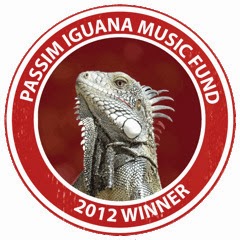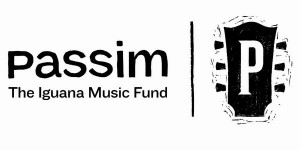Dan Hogan is the Executive Director at Club Passim. In case you have been under a rock for the past 50 years, Passim has been one of the most respected listening rooms for folk music in the country (nevermind, the city) since, well, good folk has been around these parts really. The folks at Passim have been a cultivator of great music and incredible supporter of younger musicians just getting their start for a very long time. Something we all too often may take for granted around here. As a way to give back and show this, each year The Iguana Fund toss out its line and sees what great new projects from artists hook onto the bait. They then…well, I will let Dan tell you all about it. Read on below for some Q & A from the man (named Dan):
1. We know what the Iguana fund is (by reading the site, of course), but why do you feel it is so important to give back to this community and foster the artistic endeavors of the musicians in this town?
DH: Because it’s a core part of our mission at Passim, which has three legs: Nurturing artists at all stages of their development, building community, and creating exceptional musical experiences.
2. If you had to narrow it down, what has been one of the most original uses of the fund in your eyes to date? Anything particularly stand out?
DH: Rose Polenzani and her group “Sub Rosa” back in 2008 were one of the original grantees and their “Three-Mile Island Project” has been unbelievably successful. The grant allowed members of that group to go on a week-long song-writing retreat to Three-Mile Island on Lake Winnipesaukee. The collaboration and camaraderie resulted in a host of new songs and collaborations. We’ve now given them an ongoing grant because it’s been so productive.
And here’s what Alastair Moock said of his grant: “The 2013 Iguana Fund grant helped me create an album for kids with cancer which has now been distributed to nearly 1,500 patient families around the country. In an era when musicians are increasingly giving away their work for free – sometimes by choice, as in this case, oftentimes not – patronage of the arts has never been more important. The Iguana Fund is one of the very best and most accessible organizations out there directly supporting musicians in their work.”
3. So, any special advice for folks filling out their forms to catch the attention of the selection committee?
DH: We are very concerned with artistic excellence and that will always remain a top priority. It should be a project or request where our help will show some tangible results. We often help out with some stage of CD production.
Remember that we also give grants for providing creative and valuable community service. So, we’ve given grants for bands performing at veteran’s hospitals or nursing home and for an artist doing a DVD for children facing life-threatening illnesses in hospitals.
4. Passim holds a very special place in the folk history of not just Boston, but for American roots/folk music in general. What makes Passim special to you?
DH: It’s that we’re still doing what we were 55 years ago – by providing a supportive community and place to help young artists hone their craft as they develop their careers.
5. Finally, give us a few words (aside from the obvious, we are supporting musicians with monetary gifts!) on why artists should submit to the Iguana Fund.
DH: In the total scheme of things, the size of our gifts is small ($500-$2,000). But the impact is often huge in terms of helping an artist complete some project that might have stalled or that needed some kind of push. Once you have a grant, you feel an obligation to make sure you do what you said you would. And that is good, both for you and for the world of music. We have also found that receiving an Iguana grant can help an artist with other grants.
They have extended the application date for the Iguana Fund until WEDNESDAY, October 23rd. You still have two days to apply, so head on over to the site and fill out the form!
APPLY HERE


